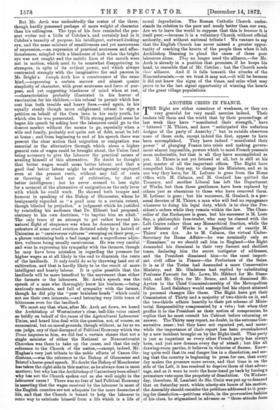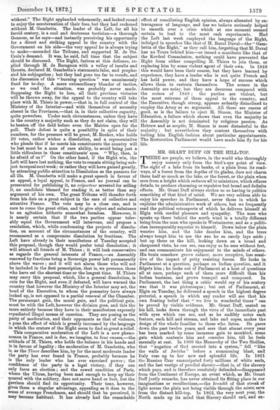ANOTHER CRISIS IN FRANCE.
THE Right are either conscious of weakness, or they are very grateful for very small mercies indeed. Their leaders tell them and the world that by their proceedings of last week they have "manifested their strength," have " fettered " M. Thiers, and have " anticipated the nefarious designs of the party of Anarchy ;" but to outside observers none of those ends, except indeed the first, appear to have
been accomplished. They have indeed " manifested their power " of plunging France into crisis and making govern- ment almost impossible, powers which to most French peasants seem undesirable, but that is all they have accomplished as yet. M. Thiers is not yet fettered at all, but is still at his post, master of all the important offices. The Right have compelled him, they say, to change his Ministers, and so in one way they have, for M. Lefranc is gone from the Home Office with M. Calmon, and M. Goulard has quitted the Treasury, and another Liberal has left the Department of Works, but then these gentlemen have been replaced by others just as obnoxious to those who have removed them. M. Lefranc is gone ; but his successor, M. Goulard, is a per- sonal devotee of M. Thiers, a man who will feel no repugnance whatever to doing his legal duty, which is to obey the Pre- sident's orders while they remain within the law. The Chan- cellor of the Exchequer is gone, but his successor is M. Leon Say, a philosophic free-trader, who may be classed with the Left Centre rather than any Monarchical fraction, while the new Minister of Works is a Republican of exactly M. Thiers' own dye. As to M. Calmon, the virtual Under- Secretary for Home Affairs—he was nominally only an
Examiner," as we should call him in England—the Right demanded his dismissal in their very fiercest and shrillest tones, declaring him the secret instigator of addresses, and the President dismissed him—to the moat import- ant civil office in France—the Prefecture of the Seine. It is as if the Tories had demanded a more Conservative Ministry, and Mr. Gladstone had replied by substituting Professor Fawcett for Mr. Lowe, Mr. Hibbert for Mr. Stans- feld, and Mr. Glyn for Mr. Bruce, and had dismissed Mr. Ayrton to the Chief Commissionership of the Metropolitan Police. Lord Salisbury would scarcely feel his object attained in personal changes like those. The Right have got their Commission of Thirty and a majority of two-thirds on it, and the two-thirds adhere heartily to their pet scheme of Minis- terial Responsibility compensated by a veto ; but when they proffer it to the President as their notion of compromise, he replies that he must consult his Cabinet before returning an answer. The Thirty may report, no doubt, in the extreme Con- servative sense ; but they have not reported yet, and mean- while the importance of their report has been overshadowed by a new incident brought on by the Right itself. That party is just as impatient as every other French party has always been, and just now dreams every day of attack ; but like all drawing-room parties, it believes in victories of finesse. Know- ing quite well that its real danger lies in a dissolution, and see- ing that the country is beginning to press for one, that every day makes the pressure more severe, and that time is on the side of the Left, it has resolved to deprive them of that advan- tage, and as it were to make the hour-hand go back by forcing a premature vote upon the propriety of dissolution. On Wednes- day, therefore, M. Lambert de Ste. Croix was put up to demand that on Saturday next, within ninety-six hours of his motion, the Assembly should consider the petitions addressed to it pray- ing for dissolution—petitions which, in the provocative fashion of his class, he stigmatised in advance as " those attacks from without." The Right applauded vehemently, and looked round to enjoy the consternation of their foes, but they had reckoned without M. Gambetta. The leader of the Left, for all his fervid oratory, is a cool and dexterous tactician—a thorough Genoese, as he says—and instantly perceiving his opportunity for, a direct and striking appeal to the country with the Government on his side—the very appeal he is always trying to make—ascended the Tribune, and supported M. de Ste. Croix's demand. It was, he said, full time that the subject should be discussed. The Right, furious at this defiance, re- plied through M. de Baragnon with a volley of insults and threats, declared M. Garnbetta's statements false, and prophe- sied his subjugation ; but they had gone too far to recede, and the discussion of this "burning question " was unanimously fixed for to-day. A more extraordinary blunder of tactics, as we read the situation, was probably never made. Supposing the Right to lose, all their previous victories will be thrown away, for the appeal to the country will take place with M. Thiers in power,—that is, in full control of the Ministry of the Interior—and with themselves of necessity absent in the Provinces,—that is, in their collective capacity, quite powerless. Under such circumstances, unless they have in the country a majority such as they do not claim, they will be beaten off the field before even the Mairies open for the poll. Their defeat is quite a possibility in spite of their numbers, for the pressure will be great, M. Rouher, who holds 20 votes, rather wishes a dissolution, and a representative who pleads that if he meets his constituents the country will be lost must be a man of rare ability, to avoid being just a little ridiculous in those constituents' eyes. " Why, then, is he afraid of us I" On the other hand, if the Right win, the Left will have lost nothing, the vote to remain sitting being sub- ject to repeal next week; or rather they will have gained greatly, by attracting public attention to Dissolution as the panacea for all ills. M. Gambetta will make a great speech in favour of an appeal, a legal appeal, to France, and no journal can be prosecuted for publishing it, no eolporteur arrested for selling it, no candidate blamed for reading it, as better than any argument of his own. The great Tribune will thunder forth from his dais on a great subject in the ears of collective and attentive France. The vote may be a close one, and is sure to rouse the great cities, and to give object and substance to an agitation hitherto somewhat formless. Moreover, it is nearly certain that if the two parties appear toler- ably equal the Government will intervene, and propose a resolution, which, while condemning the projects of dissolu- tion, on account of the circumstances of the country, will recommend as a compromise dissolution by fractions. The Left have already in their manifestoes of Tuesday accepted this proposal, though they would prefer total dissolution ; it will attract all friends of M. Thiers ; it will look conservative as regards the general interests of France,—an Assembly renewed by fractions being a Sovereign power left permanently above the waves ; and it will not alarm those who will not be included in the first proscription, that is, we presume, those who have sat the shortest time or the longest time. M. Thiers may carry this proposal, which, like a general dissolution, is ruin for the Right, and even if defeated, will have warned the country that however the Ministry of the Interior may act, the head of the Executive, to whom the peasantry have always looked up, is not opposed to a partial renewal of the Chamber. The permanent gain, the moral gain, and the political gain, must be with the Left, however the division goes, and this the more entirely because they have in their manifestoes expressly repudiated illegal means of coercion. They are posing as the party of moderation, and their opponents as that of violence, a pose the effect of which is greatly increased by the language in which the orators of the Right seem to find so great a relief.
This comparative moderation of the Left is a new pheno- menon in France, and is due, we imagine, to four causes,—the attitude of M. Thiers, who holds the balance in his hands and is in favour of legality ; the moderation of M. Gambetta, who is, as the Times describes him, by far the most moderate leader the party has ever found in France, probably because he is the only leader who has ever exercised power ; the confidence of the party in a legal victory, if they can only force an election ; and the cowed condition of Paris, where the Mtras, having been mad enough to keep up-their quarrel with the soldiery, dare not move hand or foot, lest the garrison should find its opportunity. Their tone, however, gives them a singular advantage, appealing as it does to the sense of average Frenchmen, and should that be perceived, it may become habitual. It has already had the remarkable
effect of conciliating English opinion, always alienated by ex- travagance of language, and has we believe seriously helped to smooth over a crisis which at one moment seemed certain to lead to the most rash experiments. Had the Left last week employed the language of the Right, indulged in speeches like that of M. Raoul Duval—the " Gam- betta of the Right," as they call him, forgetting that M. Duval has no Tours behind him—or issued a manifesto like that of the Kerdrel Commission, nothing could have prevented the Right from either compelling M. Thiers to join them, or replacing him by some violent agent of their own. In 1848 this would have been their coarse, but they have learned by experience, they have a leader who is not quite French and has held power, and they have a hope of success which allows them to restrain themselves. The scenes in the Assembly are noisy, but they are decorous compared with the scenes of 1848 ; the parties are violent, but the most extreme of them appeal to the country, and the Executive, though strong, appears ardently disinclined to employ the Army as an argument. All these are omens of good, as is the failure to eject M. Simon, the Minister of Education, a failure which shows that even the majority in the Assembly is not dominated by religious passion. As Hebrew and as sceptic, M. Simon is most distasteful to the majority ; but nevertheless they content themselves with baiting him English fashion about particular appointments. The Restoration Parliament would have made him fly for his life.











































 Previous page
Previous page